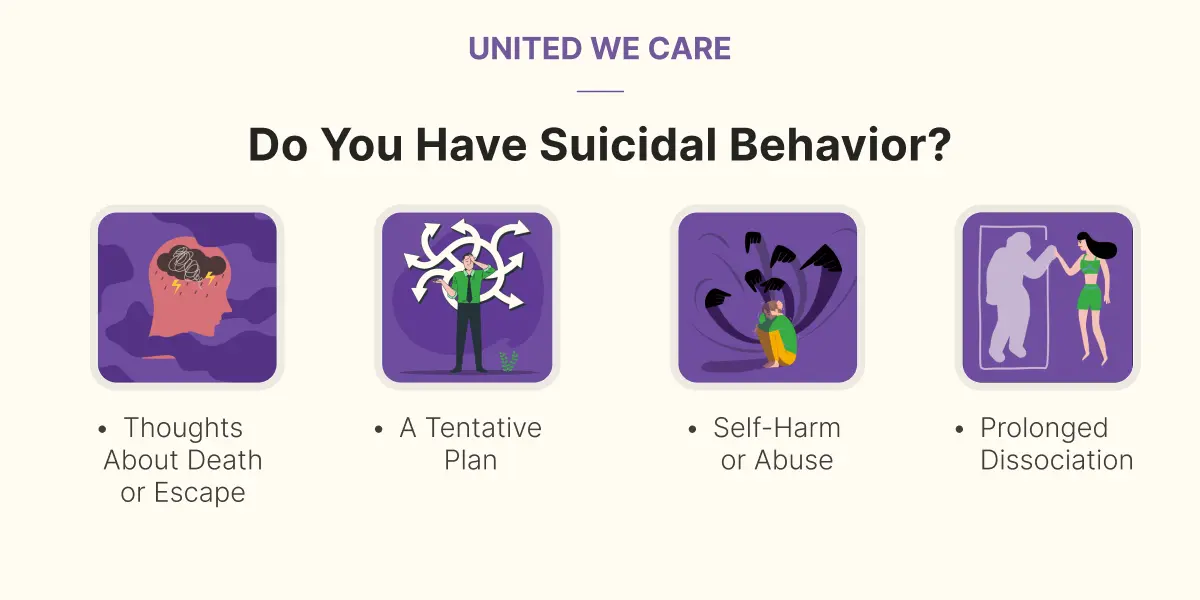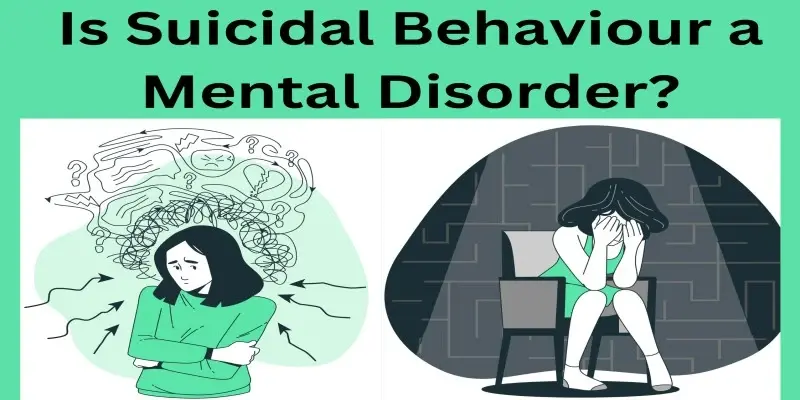Introduction
Suicidal behavior is a blanket term that covers a wide range of experiences, including thoughts, emotions, and actions centered around the pain and suffering of existence. They don’t always have to be directly linked to suicide. But gradually, they do lead to more concrete and specific behavior focussed on ending one’s life.
Since these behaviors are indirectly about suicide on many occasions, people don’t understand the gravity of them. Additionally, there is a stigma about mental health and suicide in general. This makes it more complicated for one to recognize that they need help and seek it.
This article will discuss the nature of suicidal behavior, whether it is a mental disorder, and how to deal with it.
Is Suicidal Behaviour a Mental Disorder?
Essentially, suicidal behavior isn’t a mental disorder in itself. However, it is a common symptom in many prevalent psychological disorders. Primarily, these behaviors show up in affective disorders such as depression and bipolar disorder.
Suicidal behavior may also occur in psychosis, borderline personality disorder, or any other chronic health condition that reduces quality of life.
Contrary to popular belief, suicidal behavior isn’t a reflection of weak character or willpower. It is a trauma response and can happen to anyone if their nervous system is dysregulated for long enough.
Do You Have Suicidal Behavior?
It can be a lonely and isolating process to have suicidal behavior. It’s hard to understand and even harder to talk to others about it. Naturally, you may feel a fear of judgment. Possibly, you may not even have the words to articulate your experience.
Let’s look at some potential signs that you have suicidal behavior. If you can relate to these, you might be suicidal.

Thoughts About Death or Escape
Lately, have you been having existential thoughts? Are you wondering what the point of living is? Now, while philosophical questions are an important part of anyone’s spiritual journey, they can get excessive.
Especially if you find yourself spending increasingly more time thinking of an escape. It doesn’t even have to be death, but just the end of your present circumstances.
A Tentative Plan
Sometimes, when you’re caught up in these thoughts, you start considering your options. Ways to end it quickly, painlessly perhaps?
Mental health professionals always check if you have a tentative plan to end your life when conducting a risk assessment. The more specific and detailed your plan, the more likely that you will follow through.
Self-Harm or Abuse
The most obvious sign of suicidal behavior is self-harm. This can include, but is not limited to, cutting, hitting, tying up, or burning yourself. It can also be hair pulling, skin picking, or any other way of causing yourself pain.
Excessive abuse of substances and alcohol is also an indirect way of harming the self. Therefore, even that can be a sign of suicidal behavior.
Prolonged Dissociation
It is important to understand that suicidal behavior isn’t a product of willpower or anything else. Rather, it is an inevitable consequence of a physiological state that occurs when a person is under chronic stress.
Human bodies are wired to dissociate to minimize the pain of unavoidable danger. Dissociation is the body’s tendency to disconnect from consciousness to reduce pain perception. When dissociating, you no longer feel connected to your body.
Prolonged states of dissociation are bound to lead to suicidal thoughts due to the chemical changes taking place inside.
How to Overcome Suicidal Behavior?
In this section, we will look at some of the things you can do to overcome suicidal behavior. Regardless of which mental disorder you may or may not have, these tips can help anyone feeling suicidal.
Talk to Someone
Firstly, the most effective step to take when feeling suicidal is to talk to someone. Ideally, this should be a mental health professional. Nevertheless, if you cannot access one, speaking to an empathetic listener will do, too.
People have the wrong idea that talking about suicide will encourage it. In fact, the more one keeps such thoughts to themselves, the more likely they will act on them. Talking provides a release and allows a person to process their feelings better.
Get Professional Help
It is imperative to seek professional help eventually whenever suicidal behavior is spotted. This is because no matter how empathetic a listener may be, without professional training, one may say the wrong thing.
Unfortunately, such errors may turn fatal because of the sensitivity of the issue. Hence, one should always reach out to a professional as soon as possible.
Plan Your Strategies in Advance
Usually, when suicidal behavior is activated, it is very difficult to think of rational decisions. As a result, it is helpful to have a number of strategies planned out in advance for moments like this.
For example, you can have a step-by-step emergency plan printed out and placed in an accessible spot. This could have instructions like calling loved ones, breathing exercises, and grounding techniques.
Learn to Sit with Your Feelings
As suicidal behavior is caused by physiological changes, there is an element of predictability to it. What goes up must come down. Similarly, if you can train yourself to ride the wave. If you don’t act on the thoughts, with time, you are bound to return to a neutral state.
Understandably, this is easier said than done, as it requires one to sit with complex, painful feelings. Building your tolerance for emotional pain will help you reduce suicidal behavior.
Move Your Body
As mentioned a few times before, suicidal behavior is a consequence of a physiological state. It is a trauma response and is referred to as dorsal vagal activation. One effective way of deactivating this state and returning to a neutral one is to move the body.
This movement can be absolutely anything. For instance, you could try going for a run or a stroll. It could also be something simple like a dance session, some house chores, or even basic stretching.
Treatment of Suicidal Behavior
There are various approaches to the treatment of suicidal behavior. In this section, we will explore some of these.
Trauma-Informed Therapy
Earlier, people used to suggest cognitive behavioral therapy or dialectical behavior therapy for people with suicidal behavior and impulsivity. However, research shows that when you’re in a dissociative state of suicidal behavior, it’s not possible to apply CBT.
Instead, a trauma-informed approach is required that uses somatic exercises to bring a person out of this state. This approach also psycho-educates the individual about these physiological states so that they feel more empowered to care for themselves.
Pharmacotherapy
If you’ve been struggling with suicidal behavior for multiple years, it makes sense to get pharmaceutical support. Keep in mind that medicines are not the solution by themselves. It takes deep inner work to overcome suicidal tendencies.
Simultaneously, it can be very exhausting to keep those efforts up. Hence, taking medication can buttress your attempts to improve your mental health.
Expressive Arts Therapy
Lastly, someone with suicidal behavior can benefit greatly from expressive arts therapy. These techniques require a person to give shape, form, or movement to subconscious feelings and needs.
Treatments like art therapy, psychodrama, puppet therapy, dance/movement therapy, etc., are a lot of fun, and they give voice to your inner self. They can be incredibly cathartic and healing.
Conclusion
Suicidal behavior is not just a suicide attempt. It also includes all the thoughts, feelings, and actions that lead up to it. For different people, this can look different. It may start as thinking of an escape from present circumstances and slowly progress to excessive substance abuse.
It is not a mental disorder in itself but a common symptom of many psychological disorders. Thankfully, there are several ways you can overcome suicidal behavior and various treatments available as well! You can contact our experts at United We Care to learn more!
References
[1] S. T. Wilkinson et al., “Pharmacological and somatic treatment effects on suicide in adults: A systematic review and meta‐analysis,” Depression and Anxiety, vol. 39, no. 2, pp. 100–112, Nov. 2021, doi: 10.1002/da.23222.
[2] A. C. Van Hoorn, “Could affect regulation via vagal nerve self- stimulation be a maintaining factor in non-suicidal self-harm?,” Medical Hypotheses, vol. 136, p. 109498, Mar. 2020, doi: 10.1016/j.mehy.2019.109498.
[3] E. Devlin, “Expressive therapies and suicidality in youth,” DigitalCommons@Lesley. https://digitalcommons.lesley.edu/expressive_theses/645/










